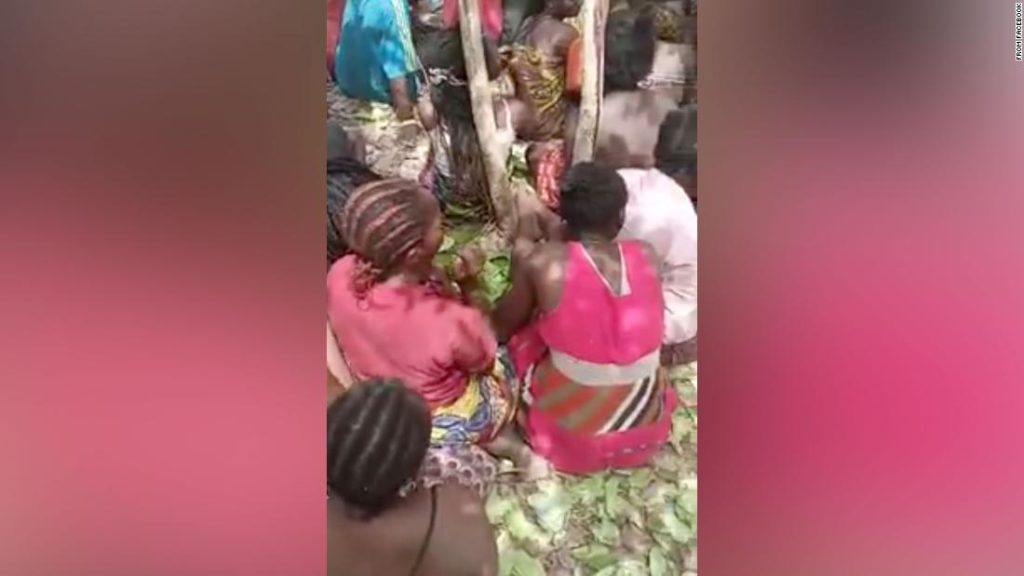In the footage, which has been widely shared on Facebook, some of the students appeared visibly distressed. In one video, an abducted student calls on the government to cooperate with their captors, while a figure in the background points a gun at his head and back.
The students were among 39 abducted on Thursday night after gunmen attacked the Federal College of Forestry Mechanization in Mando, Kaduna, according to Kaduna police.
The students, who were forcefully taken away from their hostels — some of them in their nightclothes — could be seen in the video asking the government to be diplomatic in its engagement with the gunmen.
The student calling for cooperation, whose last name is given as Emmanuel, also says that a forceful rescue operation will be met with severe consequences from the criminal gang. He added that “many of us here have been injured — badly injured… time is going…most of us here are having health issues.”
It was not immediately clear if the heavily armed kidnappers, who were clothed in military fatigues, have made any requests for ransom.
Muhammed Jalige, a spokesman for the police in Kaduna, told CNN on Sunday that the force was not aware of any monetary demands made by the assailants.
“We are not aware of that. Even if they’re going to make any request, it will be through the school management,” Jalige said, while confirming the authenticity of the video.
“The video is very authentic. The bandits used one of the kidnapped victims to record the video,” he said.
Jalige said paying ransom was not an option.
“Nobody is ready to consider that. Combatting the bandits and getting the students out is what we’re trying to do,” he said.
The Federal College of Forestry and Mechanisation is an institution of higher learning located in Afaka, a forest community close to Nigeria Defence Academy military barracks. The college’s students, who are between the ages of 19 and 25, specialize in agricultural studies.
In a statement Friday, Samuel Aruwan, Commissioner for Kaduna State Ministry of Internal Security and Home Affairs, said 180 students had been rescued by soldiers who “engaged the armed bandits.”
“The troops successfully rescued 180 citizens; 42 female students, eight staff and 130 male students … about 30 students, a mix of males and females, are yet to be accounted for,” the statement read.
Jalige told CNN on Sunday morning that 39 students are still being held by the bandits and that a rescue team was working to ensure the release of the students without any casualties.
“We have come up with a joint operation with other sister security agencies with a view to rescuing the kidnap victims unhurt,” the police spokesman said.
Daniel Atep, a student leader who heads an association of agriculture students at the college, told CNN that he recognized nearly everyone in the viral video and identified one of the captives.
“I virtually know everyone in that video,” Atep said, who also corroborated the police’s claim that the kidnappers used one of the victims to film the plea for help.
Atep added that no security measure has been put in place by the school management to ensure the safety of students in the hostels, where most of the students live, prior to the attack.
Another student, Zainab Umar, told CNN that her roommate was also spotted in the video
An aide to President Muhammadu Buhari on Saturday released a statement applauding the “early response of the military which led to the rescue of 180 students including eight staff members” and demanded the safe release of the other students.
Buhari said his government will not allow “the destruction of the school system” by “bandits targeting schools.”
Kidnapping remains rife in northern Nigeria
More than 300 schoolgirls were kidnapped from a school in Zamfara State, also in northwest Nigeria, earlier this month.
At least 42 people were abducted from a state-run school last month in Kagara, Niger State and later released, and more than 300 schoolboys were taken and later freed in December.
Kidnapping for ransom is rife in parts of Nigeria and has become a major security challenge. State governors regularly pay ransoms to secure the safety of victims but rarely admit to doing so.
Nigerian President Muhammadu Buhari recently told state governors to review “their policy of rewarding bandits with money and vehicles,” saying the policy “could backfire with potentially disastrous consequences.” Buhari also urged governors to work hard to secure their schools.
You may also like
-
Afghanistan: Civilian casualties hit record high amid US withdrawal, UN says
-
How Taiwan is trying to defend against a cyber ‘World War III’
-
Pandemic travel news this week: Quarantine escapes and airplane disguises
-
Why would anyone trust Brexit Britain again?
-
Black fungus: A second crisis is killing survivors of India’s worst Covid wave

